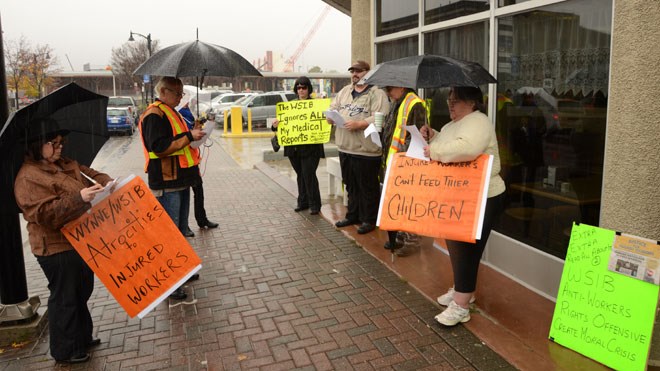A small group of protesters braved the poor weather Thursday afternoon to object to upcoming Workplace Safety Insurance Board (WSIB) policy changes they feel will deny more injured workers from fair compensation.
Colin Pick, co-chair of the Manitoulin and North Shore Injured Workers Group, said a new WSIB policy on pre-existing conditions, which will be implemented on Nov. 1, 2014, could be used to deny or reduce injured workers' claims.
“If you went to high school and broke your legs or ankles, playing hockey, and 30 years later you get injured in the workplace with a leg injury, they call that a pre-existing condition,” Pick said.
That old injury, he said, could be used as a reason to reduce an injured workers' compensation years later.
Pick served as a Sudbury police officer from 1970 to 1995, and injured his back twice while on the job.
The first time he hurt his back was in 1977, when an oil drum fell on him at a gas station. He re-injured his back in 1988 when he fell down a flight of stairs.
In his case, Pick said the WSIB did not take his former workplace injury into account for compensation in 1988, because it did not suit them financially to do so.
But Christine Arnott, a spokesperson for the WSIB, said in an email to NorthernLife.ca the new policy on pre-existing conditions will not change the general approach WSIB takes in adjudicating new claims.
“The WSIB and Workplace Safety and Insurance Appeals Tribunal (WSIAT) have always taken pre-existing conditions into consideration, but in the absence of a policy this has been done on a case-by-case basis which has led to lack of consistency and lack of transparency for the compensation system,” Arnott wrote.
The new policy was implemented in part, she said, because the WSIB was the only workplace compensation board in Canada that did not address pre-existing conditions with a specific policy.
According to the new policy, “If the pre-existing condition is not impacting the worker’s impairment, there is no effect on the worker’s benefits.”
The policy continues, “If the pre-existing condition is impacting the worker’s impairment, benefits will generally continue as long as the work-related injury/disease continues to significantly contribute to the worker’s impairment.”
Herne Steelegrave, also co-chair of the Manitoulin and North Shore Injured Workers Group, said many injured workers in Ontario died of suicide after losing their jobs due to their injuries and receiving insufficient compensation, or none at all.
“We want the policies changed so that the individual who gets injured gets fairly compensated,” Steelegrave said.
He said for a worker to be fairly compensated they should receive their claims should equal their salary before they were injured.
Join Sudbury.com+
- Messages
- Post a Listing
- Your Listings
- Your Profile
- Your Subscriptions
- Your Likes
- Your Business
- Support Local News
- Payment History
Sudbury.com+ members
Already a +member?
Not a +member?
Sign up for a Sudbury.com+ account for instant access to upcoming contests, local offers, auctions and so much more.
